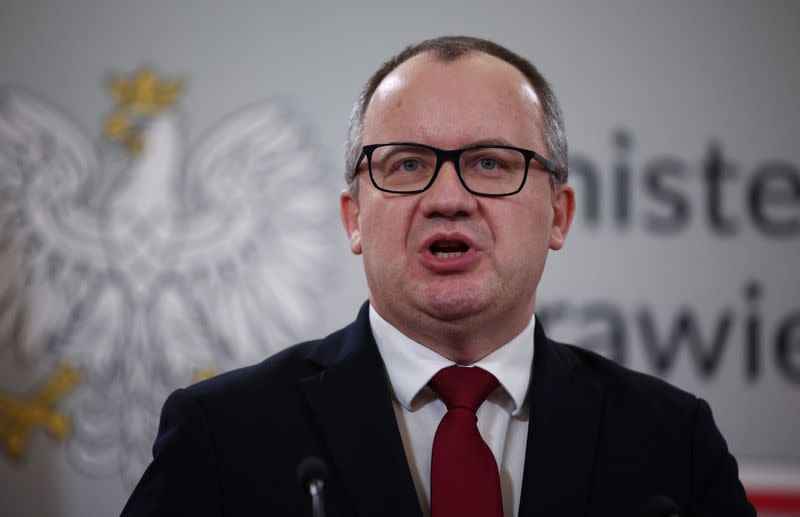Poland's Constitutional Tribunal needs total revamp, justice minister says

By Alan Charlish and Justyna Pawlak
WARSAW (Reuters) - Poland's Constitutional Tribunal needs to be rebuilt from scratch to restore its legitimacy, the justice minister said, warning that the process of restoring the rule of law in Poland would be long and complex.
Having opposed reforms under the previous government that critics say politicised the courts during his spell as Human Rights Ombudsman, Adam Bodnar has now been tasked by the new pro-European administration with rolling them back in a bid to unblock billions in European Union funds.
"The whole Constitutional Court (Tribunal) is subject to this lack of proper legitimacy," he told Reuters in an interview. "That's why we should build a new Constitutional Court from scratch and we cannot do it without a change of the constitution."
The Constitutional Tribunal, with its ability to block legislation, is a crucial component of Poland's judicial system.
However, with questions over the legitimacy of judges including three that were appointed to roles that were already occupied, combined with the close links of many to the previous government, it also lies at the heart of the challenges facing the new administration.
Under the previous government of the Law and Justice party (PiS), the court attracted criticism when it ruled Polish laws trumped EU legislation, in opposition to EU Treaties. It said abortion due to foetal defects was unconstitutional, which opened way for a near total ban on terminations in Poland.
Since PiS lost power last October, the tribunal has issued a series of rulings which could block the new government's efforts to undo reforms and complicate attempts to unblock EU funds.
PiS denies that the Tribunal is politicised and rejects any criticism of the way its judges were appointed. The party says its judicial reforms were designed to improve the efficiency of the courts and remove a residue of communist influence.
It has accused the current government of breaking the law when implementing its reforms.
The new government hopes to change the constitution to allow for the replacement of all the judges by new ones elected with a three-fifths majority of lawmakers, but does not hold a big enough majority to do that without the opposition's support.
Bodnar says this task and others facing the government is complex and will take time.
"Right now, people expect that quite suddenly we will make all relevant changes concerning the operation of judiciary, the Constitutional Court, prosecution service and different other state organs," he said.
"And second, that at the same time we will make complex procedures for accountability...in terms of moral accountability, in terms of criminal accountability for violation of the law and it simply does not work like this in a democratic country."
Another item on the government's agenda is the separation of the roles of justice minister and prosecutor general. Bodnar said he hoped legislation on this would be ready in March.
One major problem facing the new government's reform drive is the power of veto wielded by President Andrzej Duda, an ally of the previous Law and Justice (PiS) government.
This could hamper the government's attempts to meet "milestones" related to judicial independence which are needed to unblock EU funds frozen over rule-of-law concerns as well as to meet the requirements to stop the EU's so-called Article 7 procedure.
However, Bodnar said that "the European Commission sees good faith approach by the Polish government to the rule of law" and that he would present an action plan on the rule of law in Brussels on Feb. 20.
For now, Bodnar said, he was taking steps to curtail his own decision-making powers in terms of the appointments of some judges in order to reinforce the independence of courts.
"I limited my own powers to give more power to the judiciary."
(Reporting by Alan Charlish, Justyna Pawlak, additional reporting by Anna Wlodarczak-Semczuk, Editing by Angus MacSwan)

 Yahoo News
Yahoo News 
